一般现在时讲解和练习题
完整版)小学一般现在时讲解及练习题
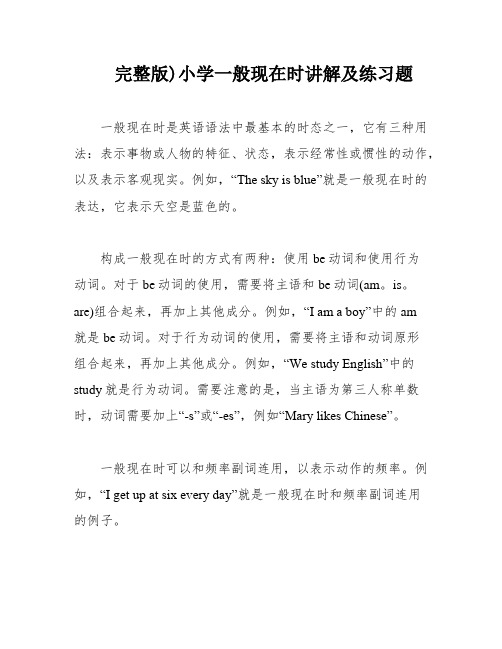
完整版)小学一般现在时讲解及练习题一般现在时是英语语法中最基本的时态之一,它有三种用法:表示事物或人物的特征、状态,表示经常性或惯性的动作,以及表示客观现实。
例如,“The sky is blue”就是一般现在时的表达,它表示天空是蓝色的。
构成一般现在时的方式有两种:使用be动词和使用行为动词。
对于be动词的使用,需要将主语和be动词(am。
is。
are)组合起来,再加上其他成分。
例如,“I am a boy”中的am就是be动词。
对于行为动词的使用,需要将主语和动词原形组合起来,再加上其他成分。
例如,“We study English”中的study就是行为动词。
需要注意的是,当主语为第三人称单数时,动词需要加上“-s”或“-es”,例如“Mary likes Chinese”。
一般现在时可以和频率副词连用,以表示动作的频率。
例如,“I get up at six every day”就是一般现在时和频率副词连用的例子。
一般现在时还可以用于构成否定句、一般疑问句和特殊疑问句。
对于be动词的否定句,需要在be动词后面加上not。
例如,“He is not a worker”就是be动词的否定句。
对于行为动词的否定句,需要在主语和动词原形之间加上don't或doesn't。
例如,“I don't like bread”和“He doesn't often play”就是行为动词的否定句。
对于一般疑问句,需要将be动词或do/does放在主语前面。
例如,“Are you a student?”就是一般疑问句。
对于特殊疑问句,需要在疑问词后面加上一般疑问句。
例如,“Where is my bike?”就是特殊疑问句。
需要注意的是,当主语为第三人称单数时,否定句和一般疑问句需要用doesn't,而不是don't或do。
例如,“He doesn't often play”和“Does she go to work by bike?”就是主语为第三人称单数时的否定句和一般疑问句。
英语一般现在时讲解及其练习题
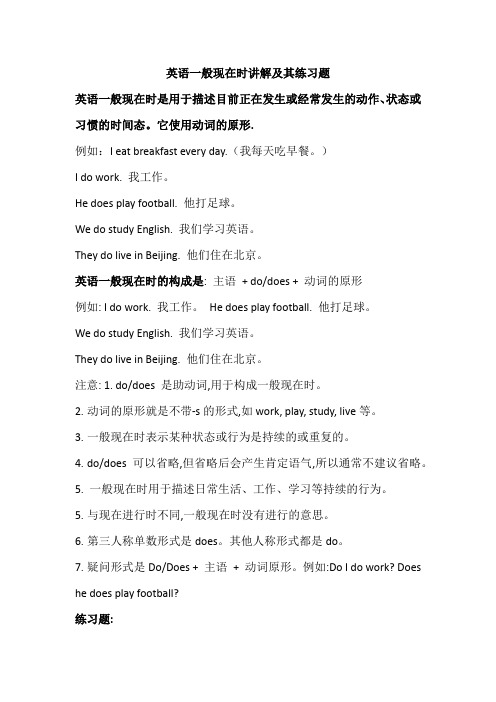
英语一般现在时讲解及其练习题英语一般现在时是用于描述目前正在发生或经常发生的动作、状态或习惯的时间态。
它使用动词的原形.例如:I eat breakfast every day.(我每天吃早餐。
)I do work. 我工作。
He does play football. 他打足球。
We do study English. 我们学习英语。
They do live in Beijing. 他们住在北京。
英语一般现在时的构成是: 主语+ do/does + 动词的原形例如: I do work. 我工作。
He does play football. 他打足球。
We do study English. 我们学习英语。
They do live in Beijing. 他们住在北京。
注意: 1. do/does 是助动词,用于构成一般现在时。
2.动词的原形就是不带-s的形式,如work, play, study, live等。
3.一般现在时表示某种状态或行为是持续的或重复的。
4.do/does 可以省略,但省略后会产生肯定语气,所以通常不建议省略。
5. 一般现在时用于描述日常生活、工作、学习等持续的行为。
5.与现在进行时不同,一般现在时没有进行的意思。
6.第三人称单数形式是does。
其他人称形式都是do。
7.疑问形式是Do/Does + 主语+ 动词原形。
例如:Do I do work? Does he does play football?练习题:一.请改正下列句子中的语法错误并将其变为一般现在时:1.She always drink tea in the morning. -She always drinks tea in the morning.2.They don't likes to eat spicy food. - They don't like to eat spicy food.3.He go to school by bus every day. - He goes to school by bus every day.4. I usually listen music while I work. -I usually listen to music while I work.5.We doesn't have any plans for tonight. - We don't have any plans for tonight.二.请改正下列句子中的语法错误并将其变为一般现在时:1. She always drink tea in the morning. -She always drinks tea in the morning.2. They don't likes to eat spicy food. - They don't like to eat spicy food.3. He go to school by bus every day. - He goes to school by bus every day.4. I usually listen music while I work. -I usually listen to music while I work.5. We doesn't have any plans for tonight. - We don't have any plans for tonight.三.用动词正确的形式填空:1. She ___________ (watch) TV every evening. Answer: watches2. They ___________ (play) basketball on Saturdays. Answer: play3. He usually ___________ (get up) at 6 o'clock in the morning. Answer:gets up4. My sister and I ___________ (like) to read books before bed. Answer: like5. The sun ___________ (rise) in the east and sets in the west. Answer: rises6. We always ___________ (have) lunch at noon. Answer: have7. Tom often _________(go )to the gym after work Answer : goes8 .My mother _________(cook )delicious meals for us Answer : cooks9.He __________ (play) basketball every weekend. Answer: plays10.The cat __________ (run) after the mouse. Answer: runs11. She usually __________ (eat) breakfast at 7 o'clock. Answer: eats12. My sister always __________ (drink) coffee in the morning. Answer: drinks13. Tom often __________ (study) English for two hours every day. Answer: studies四. 请改正下面每个句子的错误,并将其改写成一般现在时。
一般现在时知识讲解与专项练习(讲义)-人教PEP版英语六年级上册

六年级上册一般现在时知识讲解与专项练习一、一般现在时知识点【No. 1】概念:1.表不事物或人物的特征、状态。
如:The sky is blue.天空是蓝色的。
2.表示经常性或习惯性的动作。
如:I get up at six every day.我每天六点起床。
3.表示客观现实。
如:The earth goes around the sun.地球绕着太阳转。
【No.2】时间标志性词:every ... (every day/week/Sunday...)on+星期几(on Mondays/Tuesdays..)频度副词(always, usually often sometimes, rarely, seldom, never)【No.3】结构:①动词原形I like apples.②动词单三形式He plays football.③be动词I am a boy.有be无动(动:实义动词)①肯定句:主语+be+其他He is an English teacher.②否定句:主语+be not+其他He is not an English teacher.③一般疑问句:Be +主语+其他+...?Is he an English teacher?有动无be(动:实义动词)①肯定句:主语(非三单)+动词原形+其他I play football.主语(三单)+动词三单形式+其他He plays football.②否定句:主语(非三单)+don’t+动词原形+其他I don't play football.主语(三单)+doesn’t动词原形+其他He doesn't play football.③一般疑问句:Do+主语(非三单)+动词原形+其他?Do you play football?Does+主语(三单)+动词原形+其他?①肯定形式:主语十情态动词can/may+动词原形+宾语。
小学生一般现在时讲解及练习题
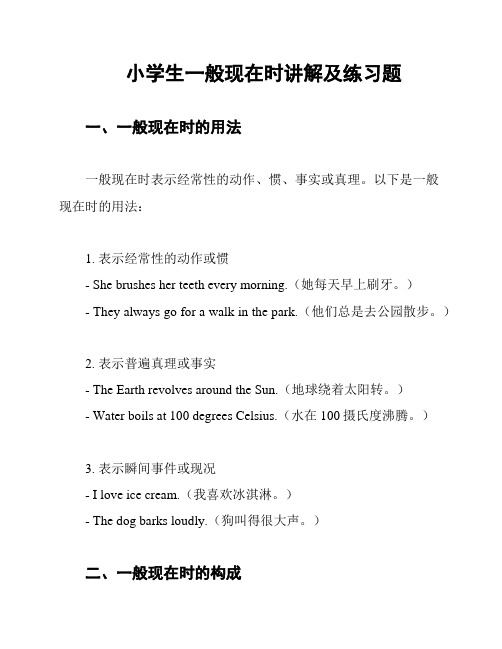
小学生一般现在时讲解及练习题一、一般现在时的用法一般现在时表示经常性的动作、惯、事实或真理。
以下是一般现在时的用法:1. 表示经常性的动作或惯- She brushes her teeth every morning.(她每天早上刷牙。
)- They always go for a walk in the park.(他们总是去公园散步。
)2. 表示普遍真理或事实- The Earth revolves around the Sun.(地球绕着太阳转。
)- Water boils at 100 degrees Celsius.(水在100摄氏度沸腾。
)3. 表示瞬间事件或现况- I love ice cream.(我喜欢冰淇淋。
)- The dog barks loudly.(狗叫得很大声。
)二、一般现在时的构成在一般现在时中,动词的变化相对简单。
1. 对于第三人称单数(He/She/It),动词要加-s或-es。
- He walks to school every day.(他每天走路去学校。
)- She eats an apple.(她吃一个苹果。
)- It runs fast.(它跑得很快。
)2. 对于其他人称(I/You/We/They),动词不变。
- I play soccer on weekends.(我周末踢足球。
)- You read books every night.(你每晚读书。
)- We go swimming in summer.(我们夏天去游泳。
)- They watch movies together.(他们一起看电影。
)三、练题请根据句意填入正确的动词形式。
1. My mother __________ (cook) dinner for us every evening.2. Tom and Lisa __________ (play) tennis on Saturdays.3. The sun __________ (rise) in the east.4. We __________ (study) English at school.5. Dogs __________ (bark) when they see strangers.1. cooks2. play3. rises4. study5. bark希望以上讲解和练习题对你有帮助!。
一般现在时讲解及练习题
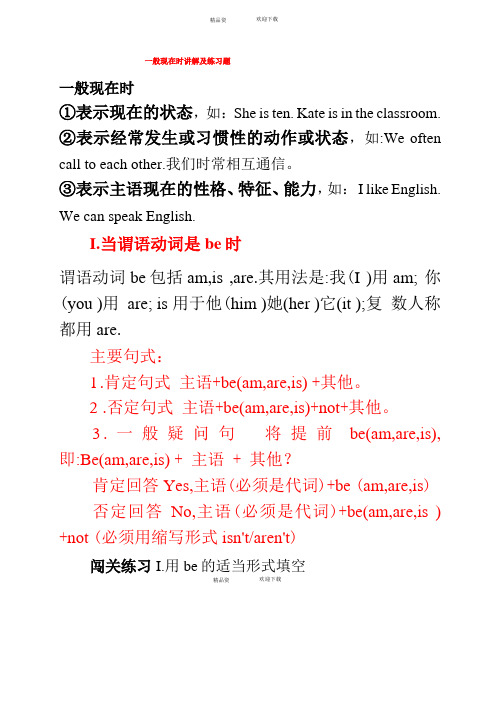
欢迎下载一般现在时讲解及练习题一般现在时①表示现在的状态,如:She is ten. Kate is in the classroom. ②表示经常发生或习惯性的动作或状态,如:We often call to each other.我们时常相互通信。
③表示主语现在的性格、特征、能力,如: I like English. We can speak English.I.当谓语动词是be 时谓语动词be 包括am,is ,are.其用法是:我(I )用am; 你(you )用 are; is 用于他(him )她(her )它(it );复 数人称都用are.主要句式:1 .肯定句式 主语+be(am,are,is) +其他。
2 .否定句式 主语+be(am,are,is)+not +其他。
3 .一般疑问句 将提前be(am,are,is), 即:Be(am,are,is) + 主语 + 其他?肯定回答Yes,主语(必须是代词)+be (am,are,is )否定回答No,主语(必须是代词)+be(am,are,is )+not (必须用缩写形式isn't/aren't )闯关练习I.用be 的适当形式填空欢迎下载 精品资 精品资1.---How you? ---I fine.2.I David,and my family name Green.3.---What color your clock? ---It white.4.---What this in English?---It an apple.5.Toy my brother.David mybrother,too.They my brothers.6.Look!These apple trees.7.We good students and you good teacher.8.My sister and my brother students.9.Five and three eight.10.your card number 5578?11.Where your pencils?12.These sweaters fifty dollars.13.How much his jacket?14.My brother,s birthday December 11th.15.When Kate,s birthday?II.将下面的句子变成一般疑问句并作出回答1.That is my football.2.Those are his books.3.Jim and Tom are good friends.4.My birthday is November 1st.欢迎下载精品资5.His son is twelve years old.111.将下面的句子变成否定句1.His card is on the table.2.There is some water in the bottle.3.Bob and Tony are our friends.4.There are thirty-five students in the classroom.5.The girl is his sister.II.当谓语动词是实义动词时1.当主语是第一人称(I \ we );第二人称(you)及复数时主要句式:(1)肯定句主语+实义动词+其他(2)否定句主语+don’t+实义动词+其他(3)一般疑问句Do+主语+实义动词+其他肯定回答:Yes,主语(必须是人称代词)+do. 否定回答:No,主语(必须是人称代词)+don’t.2.当主语是第三人称单数he, she, it及单数的名词时,主要句式:(1)肯定句:主语+实义动词的第三人称单数形式+其他一(2)否定句:主语+doesn’t+实义动词的原形+ 其他一欢迎下载精品资(3)一般疑问句Does +主语+实义动词的原形+其他肯定回答:Yes,主语(必须是人称代词)+does否定回答:No,主语(必须是人称代词)+doesn’t 动词第三人称单数形式变化规则:特殊变化have----has一、一般情况加s,例如:looks, likes, wants, plays,二、以ch, sh, s, x或o结尾的词,加-es,例如:teaches, washes, guesses, goes, does三、辅音字母+y结尾,变y为i力口-es,例如:carr yf carries, stud y f studies闯关练习I/将下面的句子变成一般疑问句并作出回答1.1h ave a baseball.2.Meria likes apples very much.3.He plays Ping-pang every day.4.We watch TV in the evening.5.Mr Wang often buys lots of things.6. Jane and Mary go to school at 7:30.II.将下面的句子变成否定句1.1n eed a bag for sport.2.He wants to go to a movie.3.She often goes to see Beijing Opera.欢迎下载精品资4.The girl has an egg for breakfast.5.We play basketball every day.6.My teacher knows my name.7.It sounds very interesting.IV.用所给词的适当形式填至1. her sister(have) a tennis racket?2.your friend(like) basketball?3.We(play) football every day.4.It(sound) very well.5.Jim(want) an orange.7.My mother(watch)TV in the evening.8. you(like) English?9. Mike and Li Lei(not like) eggs.10.What color your sister(like)?11. She(know) a little English.改写句子1.Do you often play football after school?(肯定回答)2.I have many books.(改为否定句)3.Gao Shan's sister likes playing tab改为否定句)欢迎下载4. She lives in a small town near New York. 疑问句)5. I watch TV every day.(改为一般疑问句)6. David has a goal.(改为一般疑问句)7. We have four lessons.(否定句)8. Nancy doesn't run f 肯定句)9. My dog runs fast.否定句:10. Mike has two letters for him.一般疑问句:I usually play football on Friday afternoon.一般疑问句: 精品资 (改为一般。
(完整)一般现在时讲解与练习(初中英语)
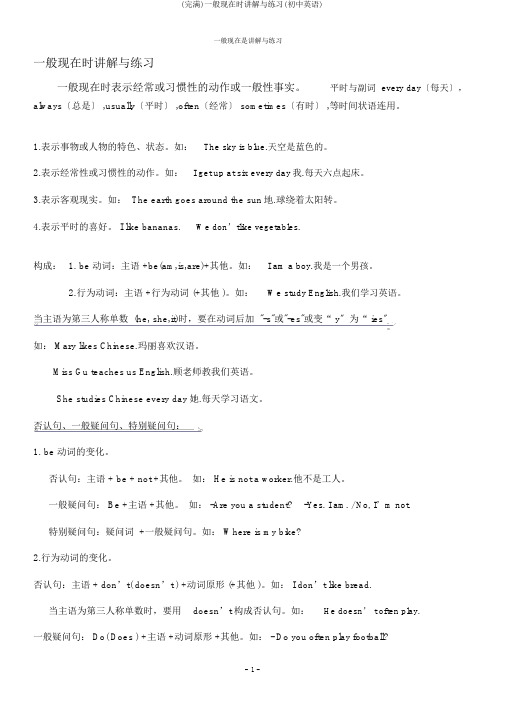
一般现在是讲解与练习一般现在时讲解与练习一般现在时表示经常或习惯性的动作或一般性事实。
平时与副词 every day〔每天〕,always〔总是〕 ,usually〔平时〕 ,often〔经常〕 sometimes〔有时〕 ,等时间状语连用。
1.表示事物或人物的特色、状态。
如:The sky is blue.天空是蓝色的。
2.表示经常性或习惯性的动作。
如:I get up at six every day我.每天六点起床。
3.表示客观现实。
如: The earth goes around the sun地.球绕着太阳转。
4.表示平时的喜好。
I like bananas.We don’tlike vegetables.构成: 1. be 动词:主语 +be(am,is,are)+其他。
如:I am a boy.我是一个男孩。
2.行为动词:主语 +行为动词 (+其他 )。
如:We study English.我们学习英语。
当主语为第三人称单数 (he, she,it)时,要在动词后加 "-s"或"-es"或变“ y〞为“ ies〞如: Mary likes Chinese.玛丽喜欢汉语。
Miss Gu teaches us English.顾老师教我们英语。
She studies Chinese every day她.每天学习语文。
否认句、一般疑问句、特别疑问句:1. be 动词的变化。
否认句:主语 + be + not +其他。
如: He is not a worker.他不是工人。
一般疑问句: Be +主语 +其他。
如: -Are you a student?-Yes. I am. / No, I’m not.特别疑问句:疑问词 +一般疑问句。
如: Where is my bike?2.行为动词的变化。
否认句:主语 + don’t( doesn’t ) +动词原形 (+其他 )。
【英语】英语一般现在时解题技巧讲解及练习题(含答案)含解析
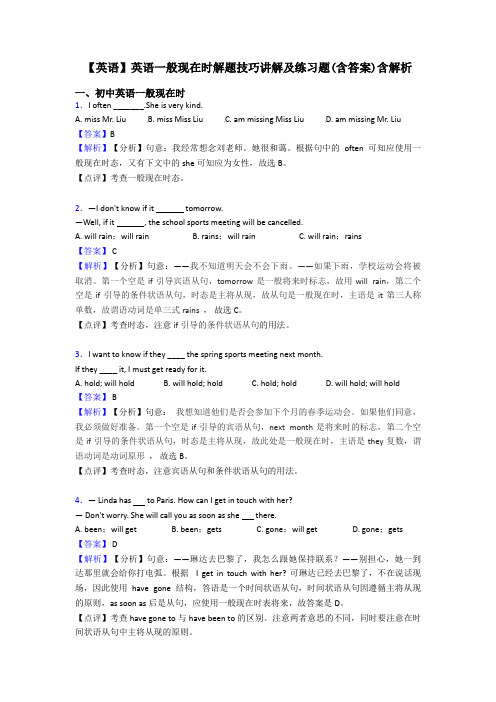
【英语】英语一般现在时解题技巧讲解及练习题(含答案)含解析一、初中英语一般现在时1.I often _______.She is very kind.A. miss Mr. LiuB. miss Miss LiuC. am missing Miss LiuD. am missing Mr. Liu【答案】B【解析】【分析】句意:我经常想念刘老师。
她很和蔼。
根据句中的often可知应使用一般现在时态,又有下文中的she可知应为女性,故选B。
【点评】考查一般现在时态。
2.—I don't know if it tomorrow.—Well, if it , the school sports meeting will be cancelled.A. will rain;will rainB. rains;will rainC. will rain;rains【答案】 C【解析】【分析】句意:——我不知道明天会不会下雨。
——如果下雨,学校运动会将被取消。
第一个空是if引导宾语从句,tomorrow是一般将来时标志,故用will rain,第二个空是if引导的条件状语从句,时态是主将从现,故从句是一般现在时,主语是it第三人称单数,故谓语动词是单三式rains,故选C。
【点评】考查时态,注意if引导的条件状语从句的用法。
3.I want to know if they ____ the spring sports meeting next month.If they ____ it, I must get ready for it.A. hold; will holdB. will hold; holdC. hold; holdD. will hold; will hold【答案】 B【解析】【分析】句意:我想知道他们是否会参加下个月的春季运动会。
如果他们同意,我必须做好准备。
第一个空是if引导的宾语从句,next month是将来时的标志,第二个空是if引导的条件状语从句,时态是主将从现,故此处是一般现在时,主语是they复数,谓语动词是动词原形,故选B。
一般现在时练习题与讲解
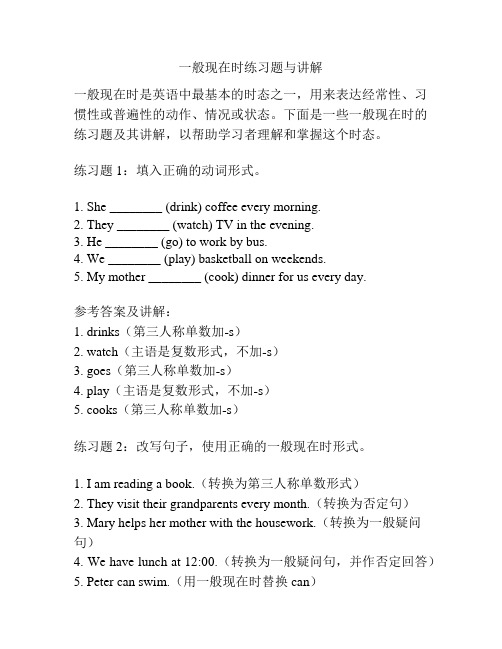
一般现在时练习题与讲解一般现在时是英语中最基本的时态之一,用来表达经常性、习惯性或普遍性的动作、情况或状态。
下面是一些一般现在时的练习题及其讲解,以帮助学习者理解和掌握这个时态。
练习题1:填入正确的动词形式。
1. She ________ (drink) coffee every morning.2. They ________ (watch) TV in the evening.3. He ________ (go) to work by bus.4. We ________ (play) basketball on weekends.5. My mother ________ (cook) dinner for us every day.参考答案及讲解:1. drinks(第三人称单数加-s)2. watch(主语是复数形式,不加-s)3. goes(第三人称单数加-s)4. play(主语是复数形式,不加-s)5. cooks(第三人称单数加-s)练习题2:改写句子,使用正确的一般现在时形式。
1. I am reading a book.(转换为第三人称单数形式)2. They visit their grandparents every month.(转换为否定句)3. Mary helps her mother with the housework.(转换为一般疑问句)4. We have lunch at 12:00.(转换为一般疑问句,并作否定回答)5. Peter can swim.(用一般现在时替换can)参考答案及讲解:1. He is reading a book.(第三人称单数形式,动词加-s)2. They do not visit their grandparents every month.(在visit前面加助动词do的否定形式,do not)3. Does Mary help her mother with the housework?(将助动词do 提前,变为一般疑问句)4. Do we have lunch at 12:00? No, we don't.(用助动词do提问,再用do not做否定回答)5. Peter swims.(一般现在时形式,去掉can)练习题3:根据给定的情景,填入正确的动词形式。
(完整word版)一般现在时专项练习题
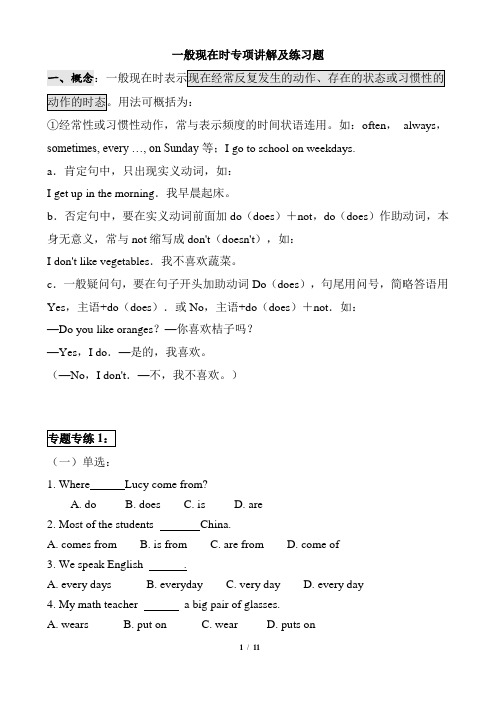
一般现在时专项讲解及练习题一、概念:一般现在时表示现在经常反复发生的动作、存在的状态或习惯性的①经常性或习惯性动作,常与表示频度的时间状语连用。
如:often,always,sometimes, every …, on Sunday等;I go to school on weekdays.a.肯定句中,只出现实义动词,如:I get up in the morning.我早晨起床。
b.否定句中,要在实义动词前面加do(does)+not,do(does)作助动词,本身无意义,常与not缩写成don't(doesn't),如:I don't like vegetables.我不喜欢蔬菜。
c.一般疑问句,要在句子开头加助动词Do(does),句尾用问号,简略答语用Yes,主语+do(does).或No,主语+do(does)+not.如:—Do you like oranges?—你喜欢桔子吗?—Yes,I do.—是的,我喜欢。
(—No,I don't.—不,我不喜欢。
)(一)单选:1. Where Lucy come from?A. doB. doesC. isD. are2. Most of the students China.A. comes fromB. is fromC. are fromD. come of3. We speak English .A. every daysB. everydayC. very dayD. every day4. My math teacher a big pair of glasses.A. wearsB. put onC. wearD. puts on5. What your father and mother ?A. does, doB. do, doC. are, doD. do, does(二)用动词适当形式填空:1. His radio is broken. It (sound)terrible.2. Did somebody drop water on the rug? It (look)wet.3. Every year my parents (give)me a present for my birthday.4. The club (send)her a letter every month.5. your dad (wash)his car once a week? Yes, he does.6. Lin Tao is a good student. He (study)very hard.7. They (work)at the bank.(三)句型转换:1. My living room has three windows. (改为否定句)2. Jim and Jack like swimming on Sundays.(就划线部分提问)3. We are in the same class. (改为一般疑问句)4. He comes from England.(就划线部分提问)一、用所给动词的适当形式填空。
一般现在时讲解及练习(含答案)

一般现在时讲解及练习(含答案)一、单项选择一般现在时1.If he ________ exercise, he______ healthy.A.not; will B.isn’t; won’t beC.doesn’t; will be D.doesn’t do; won’t be【答案】D【解析】【详解】考查if条件句中的时态。
句意:如果他不做运动,他就不会健康。
If条件句,如果主句用一般将来时态,则从句用一般现在时态,且句子主语是he,单数第三人称,故选D。
2.Whene ver you ______ a present, you’d better think about it from the receiver’s preference. A.bought B.buy C.will buy D.have bought【答案】B【解析】试题分析:句意:每当你买礼物的时候,你最好从接收方的偏好想一想。
whenever引导的让步状语从句,采用一般现在时表将来的用法。
故选B。
考点:考查动词的时态。
3.The Dragon Boat Festival ________ the beginning of the hottest season of the year.A.is marking B.marks C.will mark D.marked【答案】B【解析】试题分析:考查时态。
一般现在时表示经常性习惯性的行为。
本句中使用一般现在时端午节标志着一年中最热的季节的开始。
故B正确。
考点:考查时态4.That’s why I help brighten people’s days. If you ________, who’s to say that anothe r person will?A.didn’t B.don’tC.weren’t D.haven’t【答案】B【解析】【详解】考查条件状语从句中动词的时态。
中考英语一般现在时解题技巧讲解及练习题(含答案)
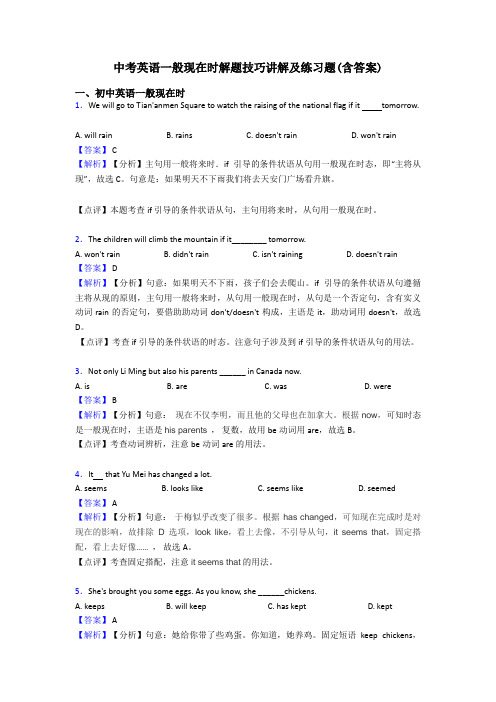
中考英语一般现在时解题技巧讲解及练习题(含答案)一、初中英语一般现在时1.We will go to Tian'anmen Square to watch the raising of the national flag if it tomorrow.A. will rainB. rainsC. doesn't rainD. won't rain【答案】 C【解析】【分析】主句用一般将来时.if引导的条件状语从句用一般现在时态,即“主将从现”,故选C。
句意是:如果明天不下雨我们将去天安门广场看升旗。
【点评】本题考查if 引导的条件状语从句,主句用将来时,从句用一般现在时。
2.The children will climb the mountain if it________ tomorrow.A. won't rainB. didn't rainC. isn't rainingD. doesn't rain【答案】 D【解析】【分析】句意:如果明天不下雨,孩子们会去爬山。
if 引导的条件状语从句遵循主将从现的原则,主句用一般将来时,从句用一般现在时,从句是一个否定句,含有实义动词rain的否定句,要借助助动词don't/doesn't构成,主语是it,助动词用doesn't,故选D。
【点评】考查if引导的条件状语的时态。
注意句子涉及到if引导的条件状语从句的用法。
3.Not only Li Ming but also his parents ______ in Canada now.A. isB. areC. wasD. were【答案】 B【解析】【分析】句意:现在不仅李明,而且他的父母也在加拿大。
根据now,可知时态是一般现在时,主语是his parents,复数,故用be动词用are,故选B。
【点评】考查动词辨析,注意be动词are的用法。
英语一般现在时全面讲解(附练习及答案)
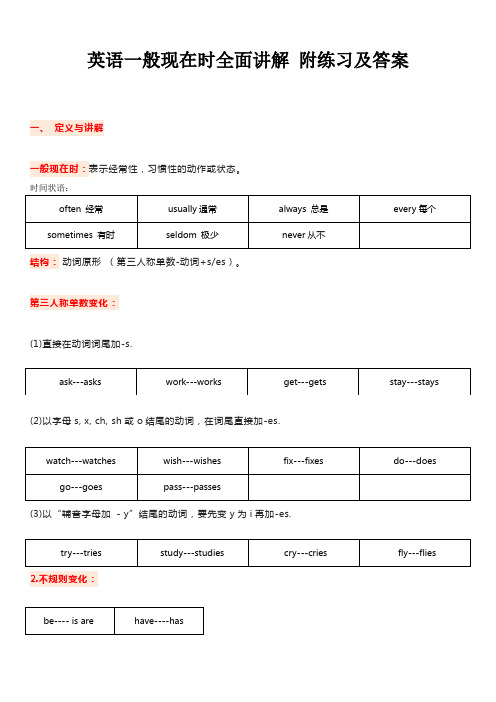
英语一般现在时全面讲解附练习及答案一、定义与讲解一般现在时:表示经常性,习惯性的动作或状态。
结构:动词原形(第三人称单数-动词+s/es)。
第三人称单数变化:(1)直接在动词词尾加-s.(2)以字母s, x, ch, sh或o结尾的动词,在词尾直接加-es.(3)以“辅音字母加- y”结尾的动词,要先变y为i再加-es.2.不规则变化:二、一般现在时用法1. 表示经常性,习惯性,永久性的动作或存在的状态.通常与副词sometimes, often, usually, always, every day (year, month ), once (twice, three times) a day,等时间状语连用。
2. 表示客观真理,科学原理,自然现象,等客观事实或格言,谚语等。
三、一般现在时的句子转换:(1)当句子中有be动词或情态动词时,则把be动词或情态动词(can,could等等)提到主语的前面变成疑问句;在be动词或情态动词后面加not变成否定句.(2)当句子中即没有be动词,也没有情态动词时,则在主语前加助动词do (you,以及复数), does(单数she,he,it)变成问句;在主语后谓语动词前加助动词don’t(I,you,以及复数), doesn’t(单数she,he,it)变成否定句,助动词后的动词要变成动词原形。
名师解析1.________ you often ________ tea?A.Do;drinks B.Does;drink C.Do;drink分析:你经常喝茶吗?根据often可知句子为一般现在时,主语为you,用助动词Do提问,动词用原形,C 符合题意,故选C。
2.My legs .A.hurt B.hurts C.hurting分析:我的腿……。
A痛,动词原形;B痛,动词单三形式,主语是名词复数,谓语动词用原形,排除;C痛,现在分词,用于现在进行时,构成be doing,缺少be,排除。
一般现在时讲解及练习
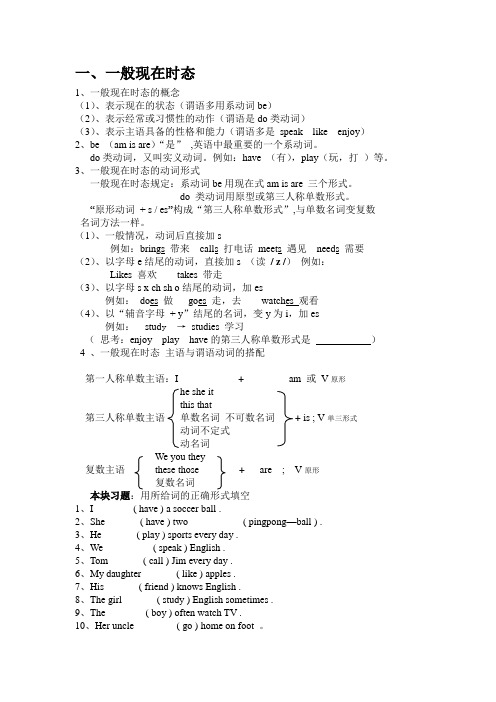
一、一般现在时态1、一般现在时态的概念(1)、表示现在的状态(谓语多用系动词be)(2)、表示经常或习惯性的动作(谓语是do类动词)(3)、表示主语具备的性格和能力(谓语多是speak like enjoy)2、be (am is are)“是”,英语中最重要的一个系动词。
do类动词,又叫实义动词。
例如:have (有),play(玩,打)等。
3、一般现在时态的动词形式一般现在时态规定:系动词be用现在式am is are 三个形式。
do 类动词用原型或第三人称单数形式。
“原形动词+ s / es”构成“第三人称单数形式”,与单数名词变复数名词方法一样。
(1)、一般情况,动词后直接加s例如:brings 带来calls 打电话meets 遇见needs 需要(2)、以字母e结尾的动词,直接加s (读/ z /)例如:Likes 喜欢takes 带走(3)、以字母s x ch sh o结尾的动词,加es例如:does 做goes 走,去watches 观看(4)、以“辅音字母+ y”结尾的名词,变y为i,加es例如:stud y →studies 学习(思考:enjoy play have的第三人称单数形式是)4 、一般现在时态主语与谓语动词的搭配第一人称单数主语:I +am 或V原形he she itthis that第三人称单数主语单数名词不可数名词+ is ; V单三形式动词不定式动名词We you they复数主语these those + are ; V原形复数名词本块习题:用所给词的正确形式填空1、I _______ ( have ) a soccer ball .2、She ______ ( have ) two __________ ( pingpong—ball ) .3、He ______ ( play ) sports every day .4、We ______ ( speak ) English .5、Tom ______ ( call ) Jim every day .6、My daughter ______ ( like ) apples .7、His ______ ( friend ) knows English .8、The girl ______ ( study ) English sometimes .9、The _______ ( boy ) often watch TV .10、Her uncle ______ ( go ) home on foot 。
小学英语一般现在时知识点全面讲解附练习及答案
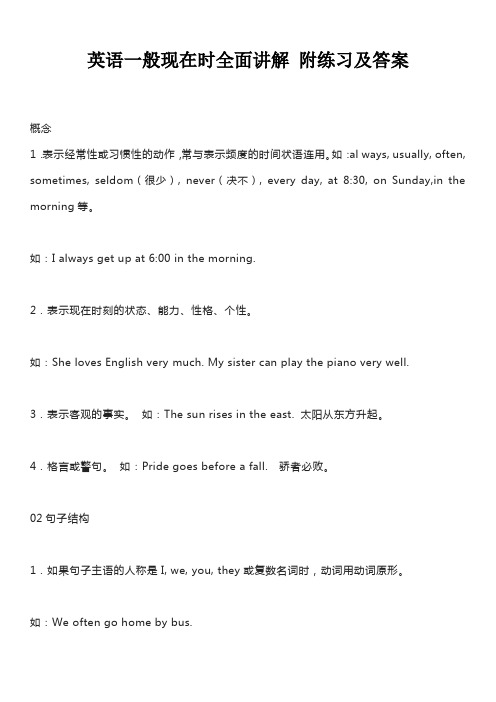
英语一般现在时全面讲解附练习及答案概念1.表示经常性或习惯性的动作,常与表示频度的时间状语连用。
如:al ways, usually, often, sometimes, seldom(很少), never(决不), every day, at 8:30, on Sunday,in the morning等。
如:I always get up at 6:00 in the morning.2.表示现在时刻的状态、能力、性格、个性。
如:She loves English very much. My sister can play the piano very well.3.表示客观的事实。
如:The sun rises in the east. 太阳从东方升起。
4.格言或警句。
如:Pride goes before a fall. 骄者必败。
02句子结构1.如果句子主语的人称是I, we, you, they或复数名词时,动词用动词原形。
如:We often go home by bus.2.如果句子的主语是第三人称单数,即:he, she, it 或单数名词时,动词要用第三人称的单数形式。
如:He often goes home by bus03动词的第三人称单数构成规则1.一般情况下在动词的后面直接加“s”;如:work→works play→plays¬ rain→rains see→sees visit→visits2.以o, x,s,sh, ch结尾的动词,在后面加“es”;如:do→does fix→fixes guess→guesses wash→washes teach→teaches3.以辅音字母加y结尾的动词,先把“y”改为“i”, 再加“es”;如:fly→flies study→studies carry→carries4.不规则变化。
如:have→has04注意在一般现在时的句子中,如果前面使用了助动词does, doesn’t, will, won’t, can, can’t, would, wouldn’t, must, mustn’t 等,尽管主语是第三人称单数,后面的动词用动词原形。
小学四种时态讲解及专项练习
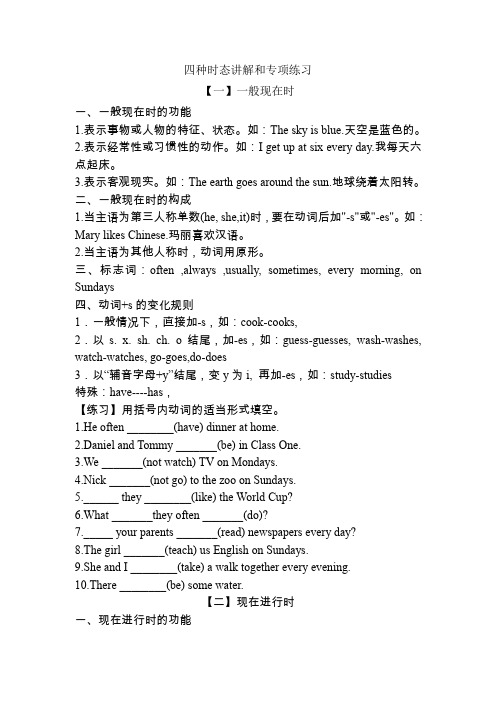
四种时态讲解和专项练习【一】一般现在时一、一般现在时的功能1.表示事物或人物的特征、状态。
如:The sky is blue.天空是蓝色的。
2.表示经常性或习惯性的动作。
如:I get up at six every day.我每天六点起床。
3.表示客观现实。
如:The earth goes around the sun.地球绕着太阳转。
二、一般现在时的构成1.当主语为第三人称单数(he, she,it)时,要在动词后加"-s"或"-es"。
如:Mary likes Chinese.玛丽喜欢汉语。
2.当主语为其他人称时,动词用原形。
三、标志词:often ,always ,usually, sometimes, every morning, on Sundays四、动词+s的变化规则1.一般情况下,直接加-s,如:cook-cooks,2.以s. x. sh. ch. o结尾,加-es,如:guess-guesses, wash-washes, watch-watches, go-goes,do-does3.以“辅音字母+y”结尾,变y为i, 再加-es,如:study-studies特殊:have----has,【练习】用括号内动词的适当形式填空。
1.He often ________(have) dinner at home.2.Daniel and Tommy _______(be) in Class One.3.We _______(not watch) TV on Mondays.4.Nick _______(not go) to the zoo on Sundays.5.______ they ________(like) the World Cup?6.What _______they often _______(do)?7._____ your parents _______(read) newspapers every day?8.The girl _______(teach) us English on Sundays.9.She and I ________(take) a walk together every evening.10.There ________(be) some water.【二】现在进行时一、现在进行时的功能现在进行时表示现在正在进行或发生的动作,也可表示当前一段时间内的活动或现阶段正在进行的动作。
一般现在时的讲解及习题
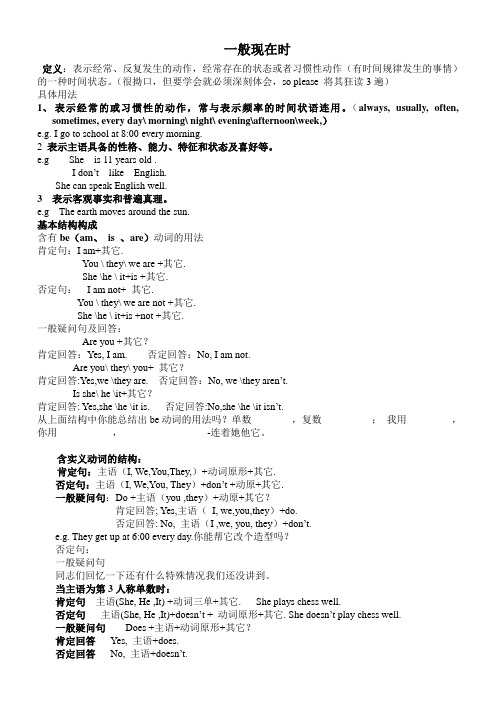
一般现在时定义:表示经常、反复发生的动作,经常存在的状态或者习惯性动作(有时间规律发生的事情)的一种时间状态。
(很拗口,但要学会就必须深刻体会,so please 将其狂读3遍)具体用法1、表示经常的或习惯性的动作,常与表示频率的时间状语连用。
(always, usually, often,sometimes, every day\ morning\ night\ evening\afternoon\week,)e.g. I go to school at 8:00 every morning.2 表示主语具备的性格、能力、特征和状态及喜好等。
e.g She is 11 years old .I don’t like English.She can speak English well.3表示客观事实和普遍真理。
e.g The earth moves around the sun.基本结构构成含有be(am、is 、are)动词的用法肯定句:I am+其它.You \ they\ we are +其它.She \he \ it+is +其它.否定句:I am not+ 其它.You \ they\ we are not +其它.She \he \ it+is +not +其它.一般疑问句及回答:Are you +其它?肯定回答:Yes, I am. 否定回答:No, I am not.Are you\ they\ you+ 其它?肯定回答:Yes,we \they are. 否定回答:No, we \they aren’t.Is she\ he \it+其它?肯定回答: Yes,she \he \it is. 否定回答:No,she \he \it isn’t.从上面结构中你能总结出be动词的用法吗?单数________,复数_________ ;我用_________,你用__________ ,______________-连着她他它。
(完整版)一般现在时的讲解及练习题
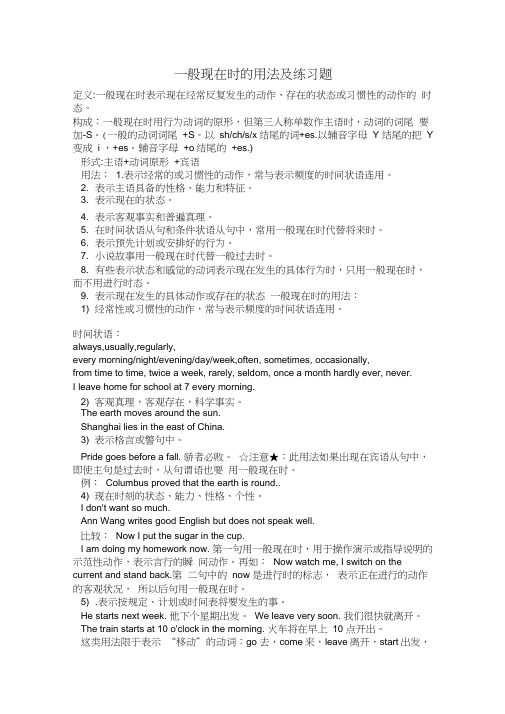
一般现在时的用法及练习题定义:一般现在时表示现在经常反复发生的动作、存在的状态或习惯性的动作的时态。
构成:一般现在时用行为动词的原形,但第三人称单数作主语时,动词的词尾要加-S。
(一般的动词词尾+S。
以sh/ch/s/x结尾的词+es.以辅音字母Y 结尾的把Y 变成i ,+es。
辅音字母+o结尾的+es.)形式:主语+动词原形+宾语用法: 1.表示经常的或习惯性的动作,常与表示频度的时间状语连用。
2. 表示主语具备的性格、能力和特征。
3. 表示现在的状态。
4. 表示客观事实和普遍真理。
5. 在时间状语从句和条件状语从句中,常用一般现在时代替将来时。
6. 表示预先计划或安排好的行为。
7. 小说故事用一般现在时代替一般过去时。
8. 有些表示状态和感觉的动词表示现在发生的具体行为时,只用一般现在时,而不用进行时态。
9. 表示现在发生的具体动作或存在的状态一般现在时的用法:1) 经常性或习惯性的动作,常与表示频度的时间状语连用。
时间状语:always,usually,regularly,every morning/night/evening/day/week,often, sometimes, occasionally,from time to time, twice a week, rarely, seldom, once a month hardly ever, never.I leave home for school at 7 every morning.2) 客观真理,客观存在,科学事实。
The earth moves around the sun.Shanghai lies in the east of China.3) 表示格言或警句中。
Pride goes before a fall. 骄者必败。
☆注意★:此用法如果出现在宾语从句中,即使主句是过去时,从句谓语也要用一般现在时。
例:Columbus proved that the earth is round..4) 现在时刻的状态、能力、性格、个性。
- 1、下载文档前请自行甄别文档内容的完整性,平台不提供额外的编辑、内容补充、找答案等附加服务。
- 2、"仅部分预览"的文档,不可在线预览部分如存在完整性等问题,可反馈申请退款(可完整预览的文档不适用该条件!)。
- 3、如文档侵犯您的权益,请联系客服反馈,我们会尽快为您处理(人工客服工作时间:9:00-18:30)。
语法讲解一:一般现在时一般现在时的讲解思路:一、定义二、一般现在时常用时间状语、时间副词三、用法:1.肯定句:2. 否定句:3.疑问句:4.特殊疑问句:一般现在时的讲解以及练习题一、定义:一般现在时表示经常或习惯性的动作,也可表示现在的状态或主语具备的性格和能力。
例:(1).表示事物或人物的特征、状态。
The sky is blue.天空是蓝色的。
(2).表示经常性或习惯性的动作。
I get up at six every day.我每天六点起床。
(3).表示客观现实。
The earth goes around the sun.地球绕着太阳转。
二、一般现在时常用时间状语、时间副词In the morning/afternoon/eveningevery week (day, year, month…)on Sundays (Monday, Tuesday…)at night, once a week,.Always总是, usually通常, often经常, sometimes有时, never从不三、用法:1.肯定句:(1)句中有be(am,is,are)和情态动词时,①be动词时,主语是I时要用am,主语是you时要用are,其他用is。
②是情态动词时,后面的动词用原型③例:I am a student.You are very beautiful.She is my best friend.He can do his homework by himself(2)没有be(am,is, are)动词和情态动词:主语为第三人称单数(she ,he ,it )、单数可数名词、不可数名词的,动词要按规则加上s或es;主语是复数可数名词的肯定句,动词用原形。
例:①She(He, It )likes fish. 她(他,它)喜欢鱼。
(主语为第三人称单数)②The table has four legs.桌子有四条腿。
(主语为单数可数名词)③Water boils at 100 degrees Celsius.水在100度沸腾。
(主语为不可数名词)They go to school every day .他们每天都去上学。
(主语是复数可数名词的,动词用原形)注意的问题:第三人称单数以及第三人称单数时动词的变化规则在一般现在时中,当主语是第三人称单数时,谓语动词要用第三人称单数形式,即常在动词原形后加-s或-es。
但有些同学们对于哪些主语是第三人称单数还不十分清楚,现归纳总结如下:1、人称代词he, she, it是第三人称单数。
如:He likes watching TV. 他喜欢看电视。
She has lunch at twelve. 她十二点吃午餐。
It looks like a cat. 它看起来像只猫。
2、单个人名、地名或称呼作主语;是第三人称单数。
如:①Ha n Mei looks like her mother. 韩梅看起来像她的母亲。
②Beijing is in China. 北京在中国。
③Uncle Wang often makes cakes. 王叔叔经常做蛋糕。
3、单数可数名词或"this / that / the+单数可数名词"作主语时,是第三人称单数。
如:①A horse is a useful animal. 马是有用的动物。
②This book is yours. 这本书是你的。
③That car is red. 那辆小汽车是红色的。
④The cat is Lucy's. 这只猫是露茜的。
4、不定代词someone, somebody, nobody, everything, something等及指示代词this, that作主语时,是第三人称单数。
如:①Everyone is here. 大家到齐了。
②There is something wrong with the watch. 这块手表有毛病。
③This is a p en. 这是一支钢笔。
④That is an eraser. 那是一块橡皮擦四动词+s的变化规则1.一般情况下,直接加-s,如:cook-cooks, make-makes,runs gets likes collets takes plays climbs2.以s. x. sh. ch. o结尾,加-es,如:guess-guesses, wash-washes, watch-watches, go-goes3.以“辅音字母+y”结尾,变y为i, 再加-es,如:study-studies 练习1❖1.Jenny ___ in an office. Her parents ___in a hospital.❖ A work; works B works; work C work; are working D is working; work❖2.One of the boys_____ a black hat.❖ A have B there is C there are D has❖3.Wang Mei ____ music and often ____ to music.❖ A like; listen B likes; listens C like; are listening D liking ; listen❖ 4. Jenny____ English every evening.❖ A has study B studies C study D studied❖ 5. The teachers ____(speak) English in class.❖ 6. The teacher ____(speak) English in class.2. 否定句:(1)句中有be动词(am , is , are )或情态动词( , can , should)时,否定句在be动词和情态动词后加not,I am not a teacher. He can not fly .(2) 句中没有be动词(am , is , are )或情态动词( can , should)时,主语为第三人称单数的否定句,在动词原形前加does + not (doesn’t)。
He doesn’t like cats.(3)句中没有be动词(am , is , are )或情态动词( can , , should)时,主语为复数可数名词的否定句,在动词原形前加do + not (don’t)。
They don’t go to school on Sundays.练习2❖ 1. The pot _____(not look) like yours very much.❖ 2.Brian (not live) in China.❖ 3.The picture ____ nice.❖ A. don’t look B. is looked❖ C. doesn’t look D. is looking❖ 4. I have many books.(改为否定句)❖5没下雪。
❖ 6.我妈妈不喜欢吃肉3.疑问句:(1)句中有be动词(am , is , are )或情态动词( can , , should)时,一般疑问句将be动词或情态动词放在句首。
由肯定句变为一般疑问句的步骤:①. 把be 动词(am , is , are )或情态动词( can , should)提前。
②.大写和小写的转换,句首的第一个字母要大写。
③.句末要加问号。
例:肯定句:She is a student . 疑问句:Is she a student ?肯定句: He can swim. 疑问句:Can he swim? .疑问句的回答:用什么问就用什么来回答。
Is she a student ? Yes, she is . No,she isn’t.Can you swim? Yes, I can . Yes, I can’t.(2) 句中如果没有be动词(am , is , are )或情态动词( can , should)时,主语为第三人称单数(she ,he ,it )、单数可数名词、不可数名词的疑问句要用does 来提问。
即在句首加does,句子中原有动词用原形例:—Does he like Chinese? 他喜欢汉语吗?—Yes, he does. 是的,他喜欢(汉语)。
—Does a dog eat meat? 狗吃肉吗?—No, it doesn’t. 不,它不吃(肉)。
(3) 句中如果没有be动词(am , is , are )或情态动词(can , must , )时,主语为复数可数名词的疑问句要用do 来提问。
Do you like monkeys? No, we don’t.Do students study Englsih ? Yes , they do.同时还要注意在肯定句变成否定句时,若是遇I/we→you,my→your. Some→any.句号→问号(?)Does your cat eat any fruits? 你的猫吃水果吗?练习3❖ 1.__she __ (do) the housework every day?❖ 2. Does Jenny (has) a good friend?❖Yes, she ____. (have) No. she ___. (not have)❖ 3.——you study English at school?❖Yes, I ____ (do).❖ 4.____ your sister study English at school?❖No, she____ (do)❖ 5. she lives in a small town near New York.(改为一般疑问句)6.我每天都必须来吗?❖7.你爸爸每天早上都看报纸吗?4.特殊疑问句:特殊疑问词+ am/is/are + 相应的人称/ + 其他do + 人称+ 动词原形+ 其他What/Where/Who/When/Which/why/how/whose…+ am/is/are + 相应的人称/名词+ 其他What/Where/Who/When/Which/why/how/whose…+ do/does + 相应的人称/名词+ 动词原形+ 其他❖Who am I ? 我是谁?❖Why is your mother so busy?❖你妈妈为什么这么忙?❖How are you? /is your dad? 你好吗?你爸好吗?❖What does he do everyday?❖他每天做什么?❖When does your father go to work every day?❖你爸爸每天什么时候去上班?❖Who studies very hard in our class?❖我们班谁学习非常努力?❖Which computer games do you like?❖你喜欢那种电脑游戏?练习题4❖ 1. Where ___you___ (have) lunch every day?❖ 2. Who_____(想要)to go swimming?❖ 3. why _____ Tom absent today? (be)❖ 4.I often play football on Friday afternoon? 就划线部分提问❖ 5. Lily waters the flowers everyday.❖ 6.为什么她每天都那么早去上学?❖7.他带的是谁的眼镜?❖8.你是怎么把英语学的这么好的?一般现在时课后巩固练习题一、按照要求改写句子1.This is my pencil ? (变一般疑问句)2.These red socks are Kate’s . (变一般疑问句)3.I want to buy a big green bag . (变特殊疑问句 )4.Mary does not have any books . (变肯定句)5. The clothing shop is on sale . (变为否定句)6. She likes the black bag very much . (变为否定句)7. I buy the pants for only 50 Yuan. (用she改写句子)8. It’s an English dictionary . (对画线部分提问)9. Lily and Lucy are fifteen years old now . (对画线部分提问)10. Her dog is 2 years and 5 months old . (变为否定句)11. I usually get up at seven o’clock . (用he改写句子)12. He often has hamburger and apples for dinner . (变为一般疑问句)13. My family always like thrillers . (对画线部分提问)14. Jane’s sister wants to see the comedy . (变为一般疑问句)15. Maria and Jack come to this school on Monday .(对画线部分提问)三、完成句子1. 他每天六点钟起床。
